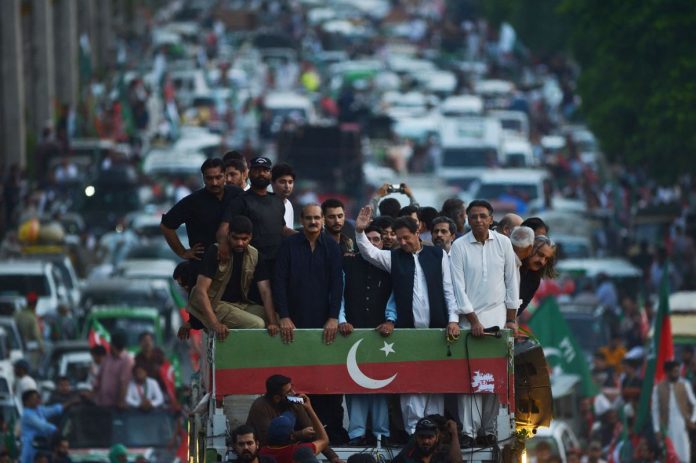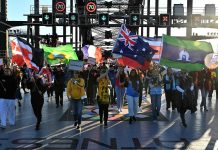Imran Khan Demands Early Pakistan Polls After By-Election Win
-
Punjab province was voting in by-elections to fill 20 seats
-
The win gives Khan an edge should early elections be called
Former Pakistan premier Imran Khan called for early national elections after his party swept the by-elections in the country’s most populous state, underscoring the risks the government faces as it seeks a bailout from the International Monetary Fund.
Khan was ousted in April following a protracted political drama that saw Shehbaz Sharif take over as prime minister. Since then Khan has held massive public rallies demanding the country head to the ballot ahead of the scheduled October 2023 dates. He’s now touting Sunday’s electoral win as a sign of popular support for his party.
“The only way forward from here is to hold free & fair elections under a credible ECP,” Khan said in a tweet, referring to the Election Commission of Pakistan. “Any other path will only lead to greater political uncertainty & further economic chaos.”
Khan’s Pakistan Tehreek-e-Insaf has won 15 out of 20 seats up fpr grabs in the Punjab state legislature and Sharif’s Pakistan Muslim League-Nawaz got four seats, Punjab Election Commission director Abdul Hameed said by phone.
Since coming to power, Sharif has been pushed to take unpopular decisions — including raising energy prices and taxes as well as reducing spending — to revive its bailout program with the IMF. The country secured a $1.2 billion loan from the multilateral lender last week to shore up dwindling foreign exchange reserves.
Pakistan expects to receive about $4 billion in external financing from friendly countries after July, following an agreement with the IMF on revival of its bailout package.
The country has a bond repayment due in December, which will be closely watched by markets to see if Pakistan can meet its obligations. The political and economic crisis has seen the bond’s yield surge since February. It reached a record 42% this month after trading below 10% since it was issued in 2017.
However, market watchers see an early election as a distraction at best and unlikely to impact talks with the IMF.
“There is a very low chance of early elections even right now,” said Suleman Rafiq Maniya, head of advisory at Karachi-based Vector Securities Pvt. “If there is an early election, it will only improve the fiscal position since a caretaker government is not involved in politicking. It’s very unlikely that the IMF program will be broken.”
Accusations
Khan, a former cricket star, has accused the ruling coalition — made up of Pakistan Muslim League-Nawaz and Pakistan’s Peoples Party — of colluding with the country’s powerful military and the US to push him out, an allegation they have all denied.
Punjab was under the control of Khan’s PTI until April when then-Chief Minister Sardar Usman Buzdar resigned after the federal parliament took up a no-confidence vote against Khan. The PTI’s subsequent nominee for the post was defeated as a faction among the party’s state lawmakers voted for Sharif’s candidate instead.
Khan then successfully petitioned the Election Commission of Pakistan to remove the state lawmakers who had defied party directives and illegally voted against it, leaving 20 seats vacant. The PTI now has control of the 371-member Punjab state assembly with a total of 188 lawmakers.
The province is considered a political stronghold for Sharif, who had been its chief minister three times and took a keen interest in infrastructure projects there. His son Hamza Shehbaz is the incumbent chief minister of Punjab. The loss is especially critical for Sharif, who had allowed officials to take advantage of a drop in oil prices and reduce pump prices ahead of the ballot.
The election victory for Khan comes as the South Asian nation deals with the highest inflation in 13 years and as foreign exchange reserves have dropped to less than two months of import cover. Moody’s Investors Service downgraded Pakistan’s outlook to negative last month.
Khan has been holding rallies across Pakistan since being ousted as premier and has drawn large crowds. While campaigning for the by-elections, he described the vote as an opportunity to end dynastic family rule and the influence of the US.









